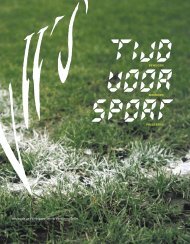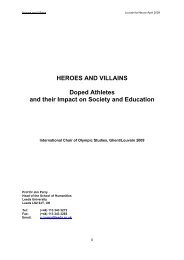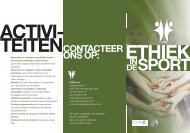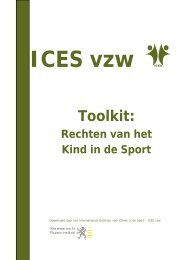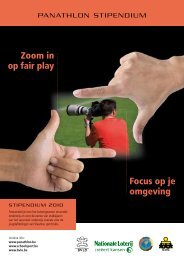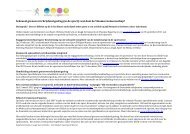Part 3 GLOBAL ISSUES: HARASSMENT AND ABUSE RESEARCH
Part 3 GLOBAL ISSUES: HARASSMENT AND ABUSE RESEARCH
Part 3 GLOBAL ISSUES: HARASSMENT AND ABUSE RESEARCH
You also want an ePaper? Increase the reach of your titles
YUMPU automatically turns print PDFs into web optimized ePapers that Google loves.
Nineteen male swimming coaches participated in one of four focus groups,<br />
and three additional coaches were interviewed separately. Males, rather than<br />
females, were selected for this study not only because they are over represented in<br />
coaching at the high school, 15 university 16 and elite levels 8, 17 but also because the<br />
majority of reported sexual abuse is by male perpetrators. 18, 19 Brackenridge and<br />
Kirby have hypothesised that athletes within the ‘stage of imminent achievement’<br />
(high level athletes who have the potential to, but have not yet earned elite honours)<br />
may be most vulnerable to coaches who groom them for sexual abuse. 20 Therefore,<br />
males coaching swimmers within this age range for swimming (about 13 to 17 years<br />
old) at international, national and developmental levels were selected for this study.<br />
The coaches ranged in age from 27 to 67 years old, had been coaching for an<br />
average of 17 years, and spent on average 22 hours a week coaching swimming.<br />
In line with grounded theory techniques 21 our initial analysis of the focus<br />
groups guided the selection of three swimming coaches (who had not participated in<br />
the focus groups) for individual interviews. These coaches were purposively<br />
selected to further our emerging understanding of coaches’ perceptions of<br />
appropriateness and the effect of child protection measures on coaching. The three<br />
coaches were selected on the following basis: the first had received a conviction for<br />
sexually assaulting a female swimmer in his care; the second was in a committed<br />
relationship with a swimmer who he was coaching; and the third had been<br />
suspended (and then cleared) by the Amateur Swimming Association during an<br />
investigation into allegations of sexual misconduct. Ethical considerations such as<br />
confidentiality, researcher safety and procedures for dealing with new allegations of<br />
abuse were all addressed prior to commencing data collection. 22 The procedures<br />
used for the data collection and analysis are detailed elsewhere, and therefore are<br />
13, 14, 23, 24<br />
not repeated here.<br />
Key findings<br />
Perceptions of appropriateness<br />
The results from this study indicate that these coaches first and foremost<br />
based decisions of appropriateness about sexual relationships with swimmers on<br />
the legal age of consent. All the coaches in this study agreed that sex with an<br />
athlete under the age of consent in England (16 years old) would be unacceptable.<br />
63<br />
63




